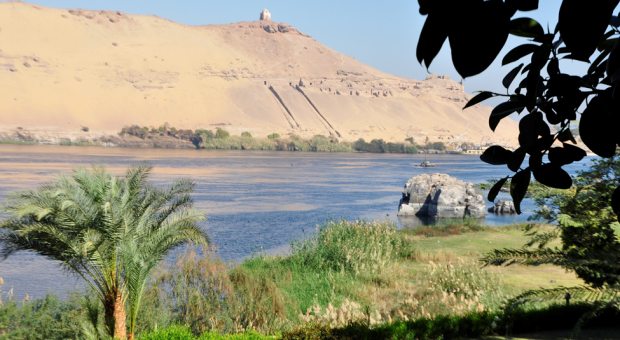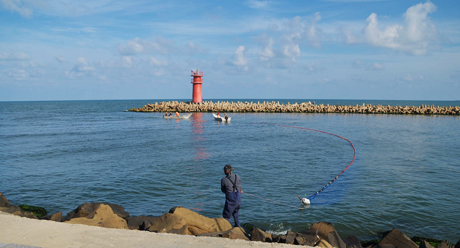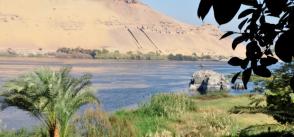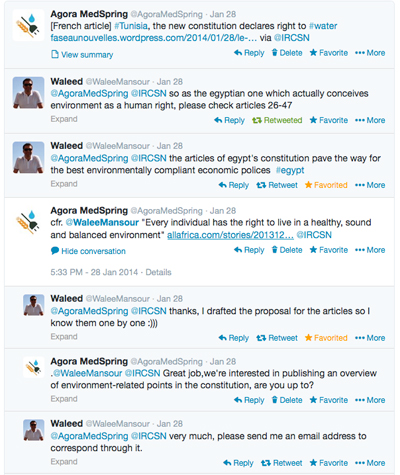
Egypt’s new constitution sets a clear environmental outlook to the country
Egypt’s new constitution sets a clear environmental outlook to the country.
The question is how to implement it: the opinion by Waleed Mansour.
Whether its Egypt or Tunisia, the flames of what was called back then the Arab spring were ignited by extreme cases of social injustice, an outcome of both economic and environmental injustice, inequality of income distribution, and extreme living conditions. All these factors resulted in health problems as well as declined basic living conditions in those countries were upheavals occurred.
A bread riot has always been a typical signal in any society for a revolution to come. For example, in France the economic crisis that took the country through bad harvests for several years broke into the French revolution. The same happened in Egypt: not only in 1977 and 2010 but also in ancient Egypt, as the following quote demonstrates:
On that day the crew passed the five guard-posts [Medjay guarding the necropolis] of the tomb saying: "We are hungry, for 18 days have already elapsed in this month [past payday - i.e., giving food and supplies] and they sat down at the rear of the [mortuary] temple of Menkheperre [Thutmose III].
Environmental degradation and climate change will certainly be among the causes of the next bread riots: it is very unlikely that our food baskets wouldn’t be impacted by these phenomena.
The 2013 Bill – a commitment to the environment
In 2013, the outbreak of a new uprising led an interim government to set a new road map. This road map included, among others, amending and modifying the existing 2012 constitutional bill (approved during the Morsi government). Eventually the new assembly showed a greater concern for environmental rights, a widely shared concern among the population.
The economic system aims at achieving prosperity in the country through sustainable development and social justice to guarantee an increase in the real growth rate of the national economy, raising the standard of living, increasing job opportunities, reducing unemployment rates and eliminating poverty.A broad commitment to sustainable Development - Article 27 - 2013 Bill
The new bill clearly presents a fair account of environmental challenges addressed in 8 articles out of the 19 articles of the chapter “governing economy, society and environment”. The articles address Egypt`s fundamental environmental problems in a constitutional context outlining the role of both the state and citizens: citizens will play a greater participatory role in the future of their country when it comes to the environment. Article 27 addresses the link between economic development and social justice, while safeguarding the environment. This, in a sense, translates into a “sustainable development triangle” with society, the economy, and the environment at each corner. The 2013 Bill don’t go further towards this broad commitment towards sustainable development but it takes extra steps to affirm the state’s responsibility in other areas, such as natural resource governance and renewable energy. Article 32 outlines the role of the state in the governance of resources in a sustainable way and it emphasizes the use of renewable energies through investment and encouraging research.
The state commits to making the best use of renewable energy resources, motivating investment, and encouraging relevant scientific research. The state works on encouraging the manufacture of raw materials, and increasing their added value according to economic feasibility.Article 32 (Second paragraph – Promotion of renewable energy)
 The unsustainable growth of the urban fabric over agricultural lands has been phenomenal in Egypt. Due to economic and social injustice, the relationship between farmers and the land deteriorated. Economic hurdles led to a housing expansion over arable land. The constitution calls for the mutual role of the state and farmers to address this problem: it ensures farmers’ participation, a fair allocation of resources in agriculture, investment for small farmers to avoid land encroachment. It also stresses the importance of democratic institutions in protecting and regulating agricultural activities to ensure a more democratic decision making process and a fair self-monitoring of the agriculture system. Moreover, the constitution emphasizes the protection of marine life and biodiversity. The protection of the Nile River is treated separately in an ad-hoc article.
The unsustainable growth of the urban fabric over agricultural lands has been phenomenal in Egypt. Due to economic and social injustice, the relationship between farmers and the land deteriorated. Economic hurdles led to a housing expansion over arable land. The constitution calls for the mutual role of the state and farmers to address this problem: it ensures farmers’ participation, a fair allocation of resources in agriculture, investment for small farmers to avoid land encroachment. It also stresses the importance of democratic institutions in protecting and regulating agricultural activities to ensure a more democratic decision making process and a fair self-monitoring of the agriculture system. Moreover, the constitution emphasizes the protection of marine life and biodiversity. The protection of the Nile River is treated separately in an ad-hoc article.
The state commits to protecting the Nile River, maintaining Egypt’s historic rights thereto, rationalizing and maximizing its benefits, not wasting its water or polluting it. The state commits to protecting its mineral water, to adopting methods appropriate to achieve water safety, and to supporting scientific research in this field.Every citizen has the right to enjoy the Nile River. It is prohibited to encroach upon it or to harm the river environment. The state guarantees to remove encroachments thereon. The foregoing is regulated by law.Nile river with a separate article regulating its use and protecting the rights and access to water – Article 44
All the above is in line with the utmost of environmental standards and perhaps it goes even beyond the ambitions of many environmental-concerned scientists and activists. It is very important to have reached this level of legal and constitutional commitment to environmental rights but turning all these into action is the real challenge we have to face.
Every individual has the right to live in a healthy, sound and balanced environment. Its protection is a national duty. The state is committed to taking the necessary measures to preserve it, avoid harming it, rationally use its natural resources to ensure that sustainable development is achieved, and guarantee the rights of future generations thereto.Environment as a human right – Article 46
An Inclusive development agenda for the future
A comprehensive part of the economic and social chapters of the country`s new constitutional framework is based on safeguarding environmental rights: international organizations and investors should now turn this positive framework into an occasion for promoting the green economy and green jobs. The articles of the constitution are open to green investment opportunities in various domains, from soil redemption to waste-to-energy processes and renewable energies. The government has now the duty to adhere to these articles. Above all, civil society has an important role to play through establishing a constructive and effective dialogue on such issues and towards future plans if it wants to play the role it is determined to play.
This collaboration with Waleed Mansour has its origins on twitter. After we published a tweet about the new Tunisian constitution and the right to water, Waleed replied saying that also the Egyptian consitution conceives the environment as a human right. The conversation went on (see the full thread in the picture) and turns into this article, a contribution on the environment-related issues contains in the new Egyptian constitution.
We thank Waleed for his valuable collaboration and we welcome similar collaborations on behalf of our network.
[Photo by camilo g. r. | flickr, "Nile meets Mediterranean" - Title photo via Waleed Mansour ]








